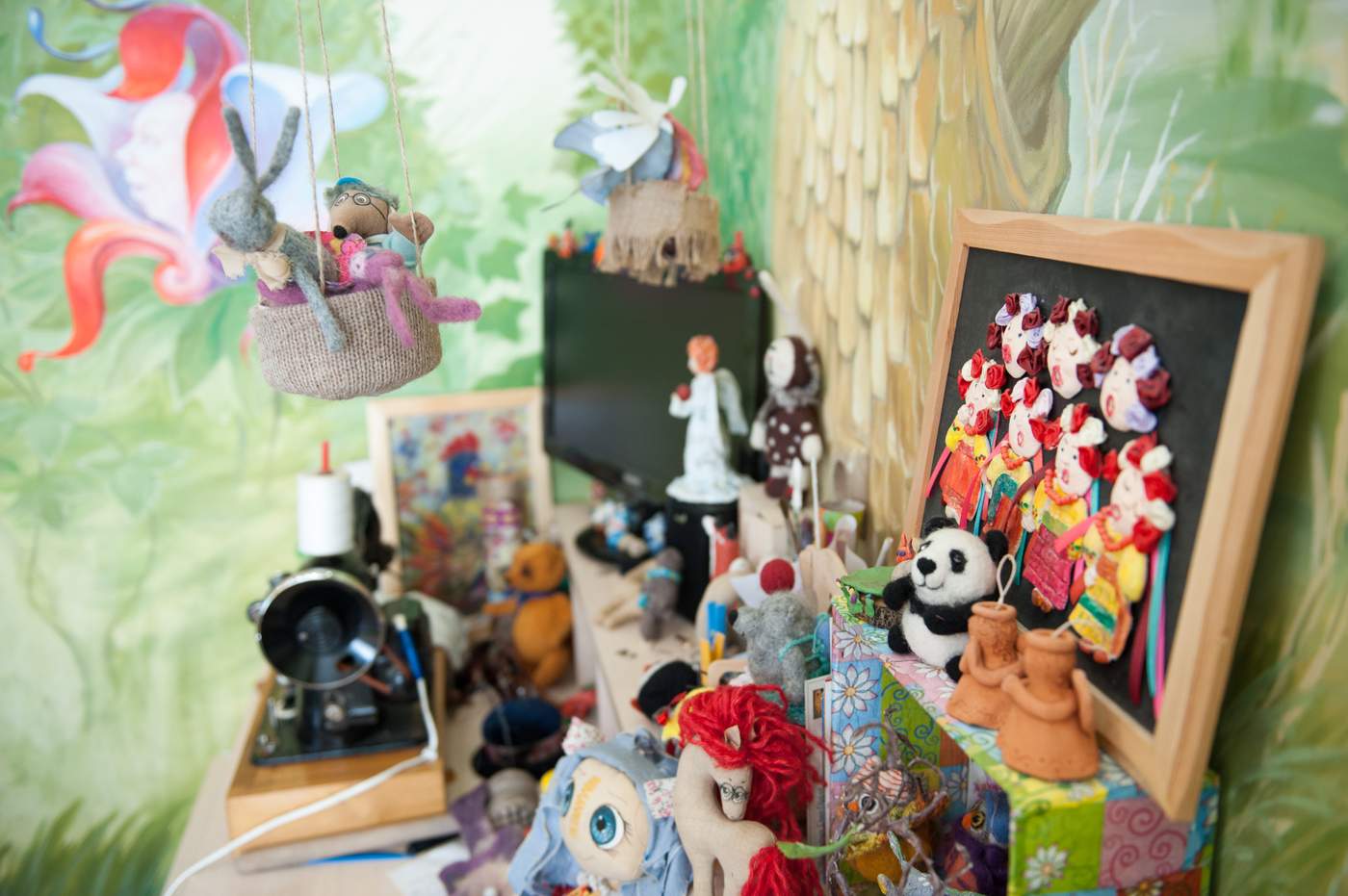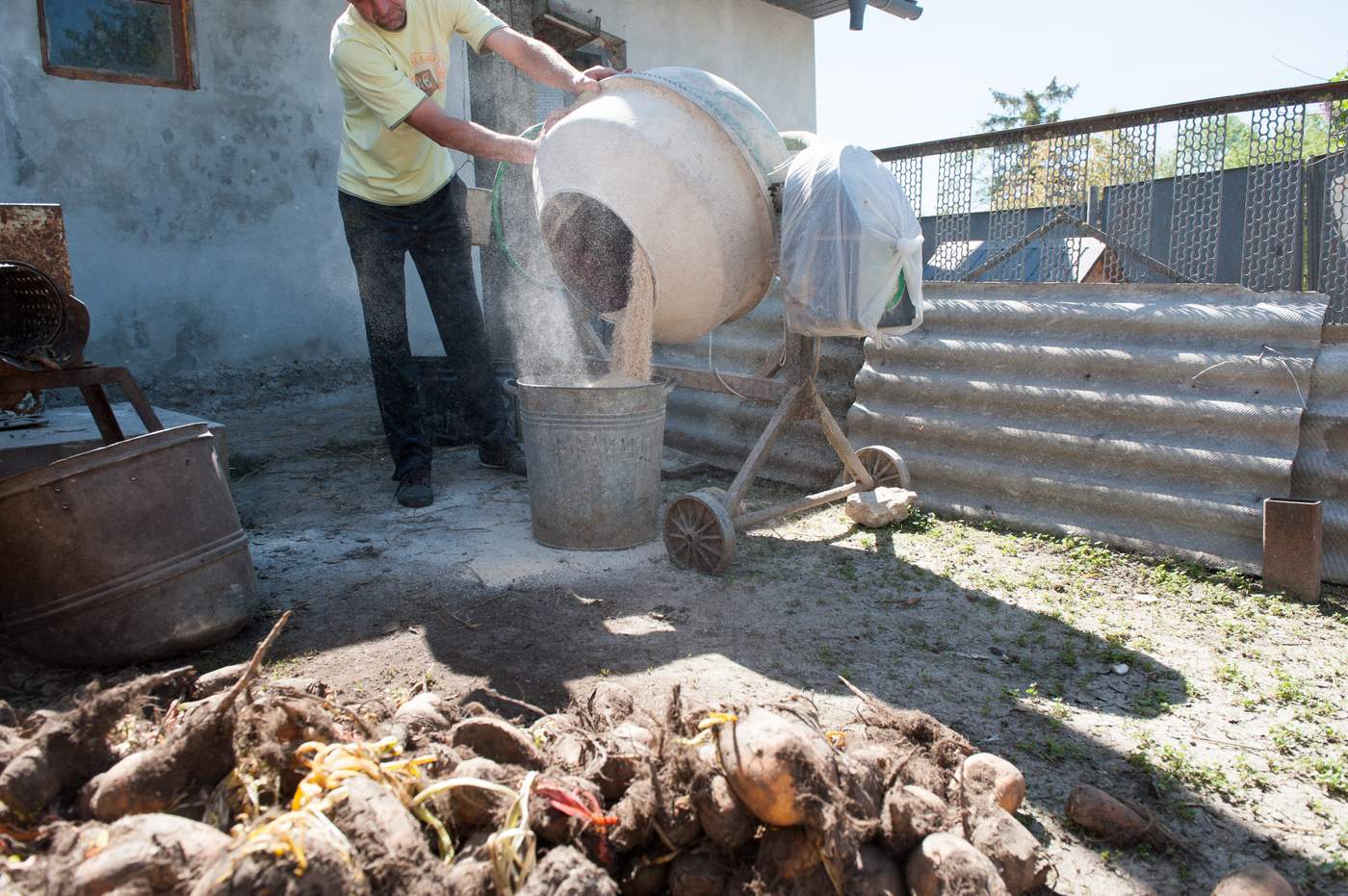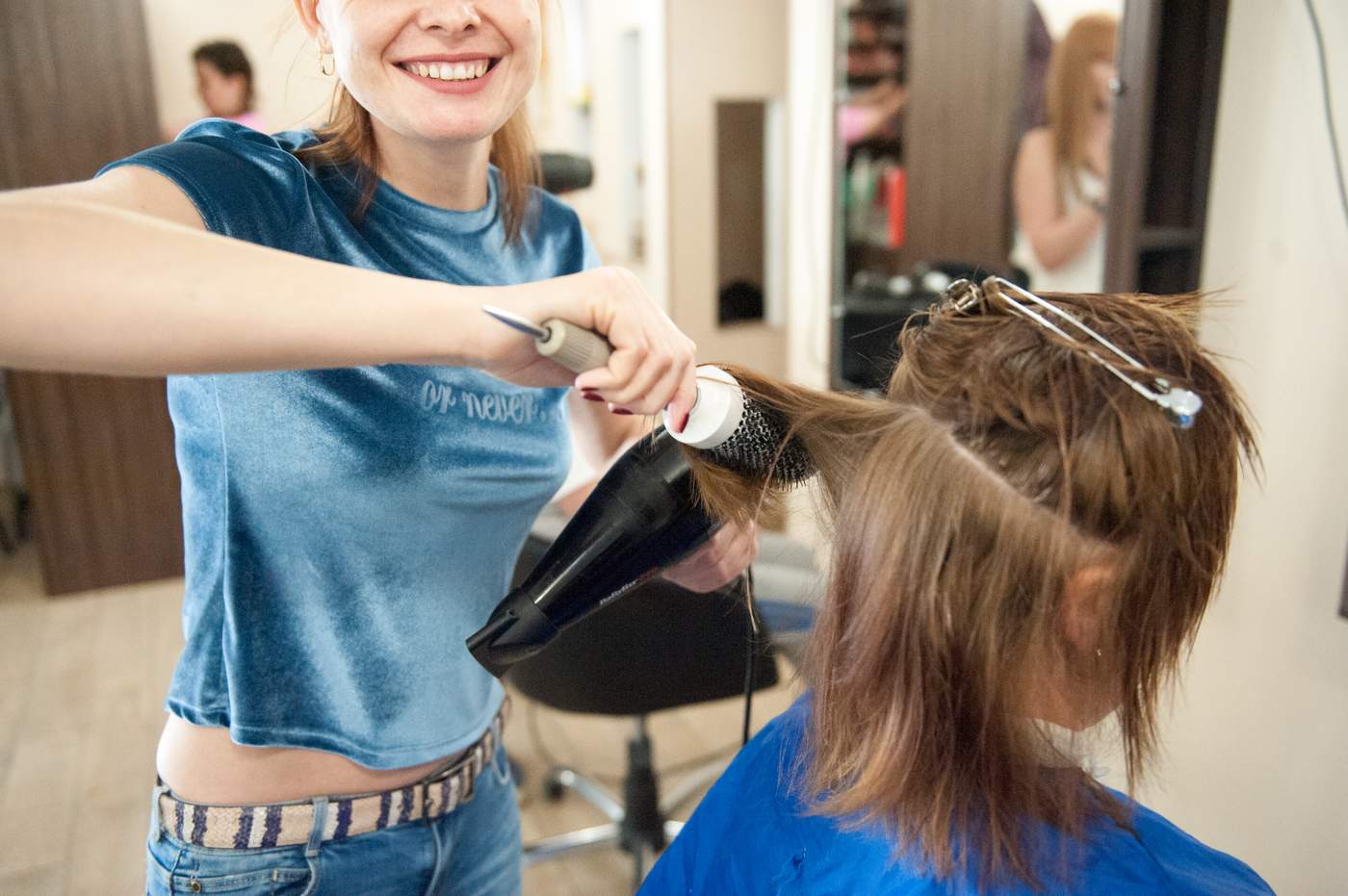This summer, IOM invited former victims of trafficking it helped to start their business to participate in a fair and forum held at the centre of Kyiv. In addition to the immediate profit from sales, the event provided a platform for networking and promotion of goods and services
As the conflict in the East adds to socio-economic instability, Ukraine remains one of the main countries of origin of victims of trafficking in human beings in Europe. The UN Migration Agency supports the Government in raising awareness, helps those who suffered, and provides alternatives to searching for further risky income opportunities at home and abroad.
Over 230,000 Ukrainians became victims of human trafficking since 1991, according to the latest research commissioned by the International Organization for Migration (IOM) – the UN Migration Agency. IOM started helping Ukrainians who had fallen prey to traffickers in 2000, with funding from donors and in cooperation with a network of partner non-government organizations throughout the country. Over seventeen years later, the UN Migration Agency has helped more than 13,000 trafficking survivors return to a dignified life. IOM provides medical care, psychological counselling, shelter, legal consultation and representation in criminal and civil court. In addition to those services, there is a vocational training and small-grant programme supporting those who aspire to set-up their own business.
Human trafficking survivors receiving medical and psychological assistance at IOM's rehabilitation centre in Kyiv
In the current context no one is immune to the threats of human trafficking in Ukraine, as the youngest victim assisted by IOM Ukraine was three, and the oldest was 83 years old.
Only in 2016, IOM assisted 1,151 men, women and children who suffered from forced labour and sexual exploitation in 21 different countries, including their home country Ukraine. About 60% of trafficking survivors identified by IOM over the recent years were men, over 90% of victims suffered from labour exploitation and over 80% were exploited in neighbouring countries, mainly the Russian Federation and Poland.
Kyrylo* and his son-in-law Oleh used to run a furniture production company in central Ukraine, which allowed them to provide for their families. A few years ago this family business went bankrupt, as they had taken a hard-currency loan and were unable to pay it back because of devaluation of Ukrainian hryvnia.
Kyrylo learnt about a possibility to go to the Russian Federation for work from his wife’s friend. The recruiters promised a luring USD 1,000 per month for the work at a fruit processing plant. The two breadwinners decided to try this opportunity, and their wives joined them, in order to double the earnings. But instead of working in a factory as promised, 18 people from Ukraine, including Kyrylo, Oleh and their wives, were forced to work in open fields collecting tomatoes, aubergines and peppers up to 18 hours per day.
The entire group was held in captivity from May till late September. Their passports were taken, the guards were armed, and those who tried to escape were caught and severely beaten. The only food provided was watery porridge. The drinking water was contaminated with chemicals used on the vegetables. People quickly started to get sick, but no medical assistance was provided.
In late September, when there was nothing left to harvest, the victims were brought back to the Ukrainian border. They were given back their passports and 200 hryvnias each (about USD 25 at that time) to pay for their way home.
Upon their return to Ukraine, the family of trafficking survivors learnt about a local IOM partner NGO providing assistance to people like them. All four received medical and psychological rehabilitation, and were invited to accomplish five-day business training and apply for micro-grants to start a furniture production business again.
In the six months after IOM provided necessary equipment to start furniture production, the family was able to open a showroom in one of the city’s trade centres. While Kyrylo and Oleh are in charge of the production cycle, Kyrylo’s wife runs the showroom. The business is steadily growing with an average monthly working capital of several thousand US dollars.
Inspiration from hand-made crafts received during IOM therapy sessions helped trafficking survivor Valentina get back in control
Valentina, a former biology and geography teacher, runs an art centre for children, a successful business that became possible with the support of IOM. The centre offers a wide range of activities for children including felting, painting, and decoupage. It is located in one of the densely populated residential areas of the city and has quickly become popular among its residents. However, few years ago, Valentina’s life was the complete opposite: she lost her job at the school due to staff reduction and had to earn money from occasional tutoring and shift jobs. She saw no opportunity to break out of the economic hardships, so she and her husband decided to go to the Russian Federation as labour migrants. They were promised a salary of USD 800 per month, but instead their passports were seized and they were forced to work 12 hours a day sorting fruits and vegetables, only receiving in exchange a piece of bread and a bowl of instant soup. It was not until six months later that Valentina and her husband were released as their health deteriorated and they were not anymore of a value for the traffickers.

The interior of Valentina’s centre has been thoughtfully planned and decorated to remind its visitors of a wonderland
Luckily, another trafficking survivor told Valentina about an IOM partner NGO working in the city. Valentina and her husband were referred for assistance, and during therapy sessions Valentina became interested in hand-made crafts.
“I felt like it helped me to recover emotionally, and really enjoyed an opportunity to create something with my hands,” says Valentina.
The IOM partner NGO also helped Valentina to look at her new hobby from a different angle which is how this business idea of an art centre was born.
Ihor worked on a farm, but he wanted to start his own agricultural business and needed money to do so. From an internet advertisement he learnt about an employment opportunity in the Russian Federation. A recruiter, whom he met in a café, promised a monthly salary of USD 1,000. He paid her about USD 150 for the services and travelled to the Russian Federation with other 160 people recruited from Ukraine in order to build bridges and other big infrastructure objects.
The workers lived on the construction sites in poor conditions, under armed surveillance and without any pay, despite being constantly promised that they would get their salary upon the completion of construction. Ihor had to work 14 hours a day, without any safety measure even while working at high altitude.
Three months later, before New Year, people were let go. The exploiters gave them no money, just tickets to get back to Ukraine.
Upon return, Ihor was devastated and his health was severely affected. Fortunately, he learnt about the IOM reintegration programme from another man from the same group of trafficking survivors. After two weeks at the IOM Medical Rehabilitation Centre for Victims of Trafficking, Ihor’s health improved and he became interested in IOM’s micro-business training and the possibility to receive a grant. With IOM support, he was able to start a pig farm on the land he inherited from his parents.
Now, Ihor has regular customers who buy meat from him and the construction of a new, bigger shed for the pigs is almost complete.

Ihor's third child was born recently, and so he is looking to increase income opportunities to support his growing family.
IOM programme has a positive effect on not only human trafficking survivors but also their community, as some of the newly established micro-enterprises create new jobs
Milana and Svitlana are from the same western Ukrainian city and both experienced labour exploitation in Poland. As a shop assistant in Ukraine, Milana went there wanting to earn start-up capital for a beauty salon. Svitlana, a nurse, needed money to purchase a flat for her family with two children.
Girls paid recruiters about USD 300 for intermediary services and were promised a salary between USD 800 to USD 1,000 per month. In Poland they picked strawberries, weeded plots of land and watered plants in greenhouses. All the while they were exposed to chemicals, without any protection, and fed very poor meals. Their passports and mobile phones were taken away and the guard that watched over them was armed and had aggressive dogs.
No need to say they were not paid, on the contrary, numerous “fines” were invented by exploiters to make people stay and “work off the debts”. When some of the workers tried to protest, all of them were beaten. Both Milana and Svitlana were let go when their exploiters felt they were no longer needed.

Milana and Svitlana received both vocational and business training from IOM
to start their beauty salon business
Milana was referred to IOM by a local State employment centre, where she was trying to find a job after returning home. While Svitlana coincidentally met an IOM partner NGO during an NGO’s awareness raising event at the city railway station. The two young women became acquainted with each other at the IOM business training for former victims of trafficking, and decided to join their efforts. The grant received helped them to equip rented premises in the city centre, they hired additional staff, and now have a growing number of clients who visit their beauty salon.
“Recently we noticed a decrease in Ukrainians’ expectations when looking for jobs abroad. If before the crisis which broke out in 2014 the promised salary was an average of USD 1,000, in 2016 victims who turned for assistance informed IOM that they were promised a much lower salary, ranging between USD 200 – 500, which was still considered satisfying,” says Manfred Profazi, Chief of the IOM Mission in Ukraine.
IOM’s experience and studies show that people with migration experience are more inclined to risky behaviour while searching for further employment abroad, than the general population. In such situations, support with income-generating opportunities at home is crucial. And this is exactly what IOM offers to former victims of exploitation to help them reintegrate into society and prevent from possible re-trafficking. For one-third of former victims of trafficking who established micro-enterprises with IOM support, these small businesses are the only source of family income. For 62%, these revenues constitute from 50% to 75% of their family budget. In the two years after they completed the IOM Economic Empowerment Programme for victims of trafficking, none of its participants were reported as recurrent migrant workers and 77% said that self-employment opportunities created with IOM support are a core motivator to stay in Ukraine.
*All the trafficking survivors' names in the story have been changed to protect privacy